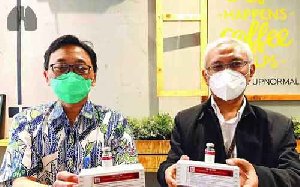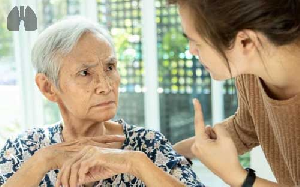
David Zhang, Ayodeji Adegunsoye, Justin M. Oldham, Julia Kozlitina, Nicole Garcia, Maria Poonawalla,Rachel Strykowski, Angela L. Linderholm, Brett Ley, Shwu-Fan Ma, Imre Noth, Mary E. Strek, Paul J. Wolters, Christine Kim Garcia, Chad A. Newton
European Respiratory Journal 2023; DOI: 10.1183/13993003.00441-2023
Abstract
Studies suggest a harmful pharmacogenomic interaction exists between short leukocyte telomere length (LTL) and immunosuppressants in idiopathic pulmonary fibrosis (IPF). It remains unknown if a similar interaction exists in non-IPF interstitial lung disease (ILD).
A retrospective, multi-centre cohort analysis was performed in fibrotic hypersensitivity pneumonitis, unclassifiable ILD, and connective tissue disease ILD patients from five centres. LTL was measured by qPCR for discovery and replication cohorts and expressed as age-adjusted percentiles of normal. Inverse probability of treatment weights based on propensity scores were used to assess the association between mycophenolate or azathioprine exposure and age-adjusted LTL on two-year transplant-free survival using weighted Cox proportional hazards regression incorporating time-dependent immunosuppressant exposure.
The discovery and replication cohorts included 613 and 325 patients, respectively. In total, 40% of patients were exposed to immunosuppression and 22% had LTL <10th percentile of normal. Fibrotic hypersensitivity pneumonitis and unclassifiable ILD patients with LTL <10th percentile experienced reduced survival when exposed to either mycophenolate or azathioprine in the discovery cohort (mortality HR 4.97, 95% CI 2.26–10.92, p<0.001) and replication cohort (mortality HR 4.90, 95% CI 1.74–13.77, p=0.003). Immunosuppressant exposure was not associated with differential survival in patients with LTL ≥10th percentile. There was a significant interaction between LTL <10th percentile and immunosuppressant exposure (Discovery p-interaction=0.013; Replication p-interaction=0.011). Low event rate and prevalence of LTL <10th percentile precluded subgroup analyses for connective tissue disease ILD.
Similar to IPF, fibrotic hypersensitivity pneumonitis and unclassifiable ILD patients with age-adjusted LTL <10th percentile may experience reduced survival when exposed to immunosuppression.
Footnotes
This manuscript has recently been accepted for publication in the European Respiratory Journal. It is published here in its accepted form prior to copyediting and typesetting by our production team. After these production processes are complete and the authors have approved the resulting proofs, the article will move to the latest issue of the ERJ online. Please open or download the PDF to view this article.
Conflict of interest: JK, NG, MP, RS, ALL, BL, SFM have nothing to disclose.
Conflict of interest: DZ reports consulting fees from Boehringer-Ingelheim grant support from the Stony Wold-Herbert Fund and Parker B. Francis Foundation.
Conflict of interest: AA reports consulting fees from Genentech, Inogen, Medscape, PatientMpower, Boehringer-Ingelheim, lecture honoraria from Boehringer Ingelheim, and grant support from NHLBI.
Conflict of interest: JO reports consulting fees from Boehringer-Ingelheim, Lupin Pharmaceuticals, AmMax Bio, Roche, Veracyte, advisory board participation with Endeavor Biomedicines and grant support from NHLBI. JO also has patent “TOLLIP TT genotype for NAC use in IPF” issued, and is an Associate Editor of CHEST, as well as a member of the Program Committee for ATS.
Conflict of interest: IN reports consulting fees from Boehringer-Ingelheim, Sanofi, data safety monitoring board participation with Yale, and grant support from Veracyte and NIH.
Conflict of interest: MES reports honoraria from Boehringer-Ingelheim, Fibrogen, American College of Chest Physicians, advisory board participation with Fibrogen Adjudication Committee, and grant support from Boehringer-Ingelheim and Pulmonary Fibrosis Foundation. MES also reports being a member of scientific Review Committee, Pulmonary Fibrosis Foundation.
Conflict of interest: PJW reports grant support from Boehringer-Ingelheim, Roche, Sanofi, Pliant, NIH, and consulting fees from Blade Therapeutics.
Conflict of interest: CKG reports grant support from NIH, DOD, Boehringer-Ingelheim, lecture honoraria from Three Lakes Foundation, Stanford, UPenn, UCSF, Cedar-Sinai.
Conflict of interest: CAN reports consulting fees from Boehringer-Ingelheim and grant support from NHLBI. CAN is also a Member of Scientific Review Committee for Pulmonary Fibrosis Foundation, member of the Editorial Board for CHEST, and member of the planning committee for ATS.
- Received March 13, 2023.
- Accepted July 26, 2023.
- Copyright ©The authors 2023. For reproduction rights and permissions contact permissions@ersnet.org














